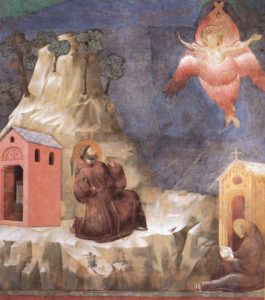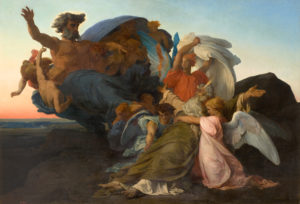One of the areas where science and faith find themselves most at odds is with respect to the concept of miracles, signs, and wonders. Modern science relies upon the belief that there are natural laws and that these laws determine the pattern that the course of events in the universe will take. Every action in the universe and its corresponding effect can be understood by relating to the appropriate natural laws that govern the universe. Miracles, signs, and wonders fly in the face of such a belief system. Christian thought accepts that God is able to act from outside of the bounds of the universe to cause effects that do not necessarily flow from natural laws. What role do miracles, signs, and wonders play in Christian theology and what is their significance for the Christian believer?
 Throughout the Biblical record, God is recorded as doing miracles, signs, and wonders. In Christian theology a miracle is an action of God that is less common than his normal activity of maintaining the natural course of the universe. This definition of a miraculous occurrence relies upon a belief about the world’s creation and maintenance that runs counter to the scientific naturalistic position which holds that the universe came into existence through purely natural means and sustains itself similarly.
Throughout the Biblical record, God is recorded as doing miracles, signs, and wonders. In Christian theology a miracle is an action of God that is less common than his normal activity of maintaining the natural course of the universe. This definition of a miraculous occurrence relies upon a belief about the world’s creation and maintenance that runs counter to the scientific naturalistic position which holds that the universe came into existence through purely natural means and sustains itself similarly.
“He is the image of the invisible God, the firstborn of all creation. For by him all things were created, in heaven and on earth, visible and invisible, whether thrones or dominions or rulers or authorities – all things were created through him and for him. And he is before all things, and in him all things hold together” (Colossians 1:15-17).
The Apostle Paul through the inspiration of the Holy Spirit wrote of the continual action of Jesus, the Son of God, who created all things and through whose activity the universe is held together. This continual activity is different from a miraculous action that is rarer and which occurs for a particular purpose. While the regular working of the universe and the amazing detail involved should of itself produce worship to God by his creatures who observe it, God does at times act specifically in order to demonstrate clearly to all who see that it is he who is acting as the one, true God who created all things and who reigns supreme over all things.
“So I will stretch out my hand and strike Egypt with all the wonders that I will do in it; after that he will let you go” (Exodus 3:20).
God promised Moses that he would do wonders in the land of Egypt where God’s people were being held as slaves.
God had a great purpose for his people, but the greatest earthly power of the time was standing in the way. The wonders that God intended to do were to be done to show that he alone was God and that all the idols that the powerful Egyptians worshiped had no power against the might of the one, true God.
 The power confrontation that occurred in Egypt and that ended with the deliverance of the people of Israel from Egypt was a testimony to all who experienced it that there is only one God who reigns over all, who has made all, and who alone deserves to be worshiped. Such acts of God are not merely demonstrations of his infinite power but are intended to draw people away from false worship in order to focus their complete worship on the almighty one who reigns supreme over all created things. Such power encounters did not end with the deliverance of the people of Israel from Egypt and their entrance into the Promised Land.
The power confrontation that occurred in Egypt and that ended with the deliverance of the people of Israel from Egypt was a testimony to all who experienced it that there is only one God who reigns over all, who has made all, and who alone deserves to be worshiped. Such acts of God are not merely demonstrations of his infinite power but are intended to draw people away from false worship in order to focus their complete worship on the almighty one who reigns supreme over all created things. Such power encounters did not end with the deliverance of the people of Israel from Egypt and their entrance into the Promised Land.
“And Elijah came near the people and said, ‘How long will you go limping between two opinions? If the Lord is God, follow him; but if Baal, the follow him’” (1 Kings 18:21).
The prophets of Israel had to regularly challenge the people to turn away from the false gods of the people who lived around them and sometimes among them. Such split worship or divided opinions kept God’s favor from coming upon the people of Israel and kept Israel from being the evangelistic example that God intended them to be. Elijah intentionally brought the issue to a head by creating a contest between God and the idol Baal. In so doing, he relied upon God acting uniquely to do wonders that only he could do to show the people that he alone was the living, powerful God who had delivered Israel from bondage and brought them to the Promised Land.
“Then the fire of the Lord fell and consumed the burnt offering and the wood and the stones and the dust, and licked up the water that was in the trench. And when all the people saw it, they fell on their faces and said, ‘The Lord, he is God; the Lord, he is God’” (1 Kings 18:38, 39).
This wonder of God produced the desired effect.
The false idol Baal was shown to have no power to act apart from being allowed to do so by the almighty God. God showed that he alone is to be worshiped and the people recognized this fact. The fire from heaven was a unique occurrence at a particular time designed to draw the people away from false worship to the only one who truly deserves to be worshiped. When the Messiah Jesus, God in human flesh, came to the people of Israel, he performed particular signs and wonders among them with the expressed purpose of causing them to worship him.
“This, the first of his signs, Jesus did at Cana in Galilee, and manifested his glory. And his disciples believed in him” (John 2:11).
The Apostle John, in writing his gospel of Jesus, wrote of a series of signs that Jesus performed that demonstrated that he was the one, true God in human flesh. The signs that Jesus performed were designed to reveal his glory as God. Though he existed in human flesh and to the common eye he appeared to be merely a man, all the power of God dwelt within him and the signs and wonders which he performed were designed to reveal his true identity to those who followed him in such a way that they would put their faith in him. While God continued to maintain all existence, Jesus walked on the earth and performed unique miraculous works that would draw true worshipers to him. Because of their ability to draw people to worship, miraculous works are part of a battle for the souls of people and the enemy will seek to counterfeit such wonders to draw worship away from the one, true God.
“It performs great signs, even making fire come down from heaven to earth in front of people; and by the signs that it is allowed to work in the presence of the beast it deceives those who dwell on earth, telling them to make an image for the beast that was wounded by the sword and yet lived” (Revelation 13:13, 14).
The more powerful a weapon is, the more likely the enemy will seek to use it in an inappropriate manner.
Where God performed miraculous signs to reveal his glory and to draw people to faith in Christ, Satan uses miraculous signs to deceive people, to lead them away from the truth, and to induce false worship of that which is not the one, true God. Miraculous signs must be spiritually assessed to determine their origin and purpose. Only signs and wonders that bring glory to God and which direct people to faith in Jesus are authentic wonders. Miracles, wonders, and signs that are of God are designed to direct worship to the one, true God and to encourage true faith. While God acts continually to maintain the course of the universe, at times he acts uniquely to reveal his glory in the world and to draw people away from the worship of idols to authentic faith. In so doing, God is shown to be the only being worthy of true worship and faith is placed in the one who created all things and maintains them by his power.






